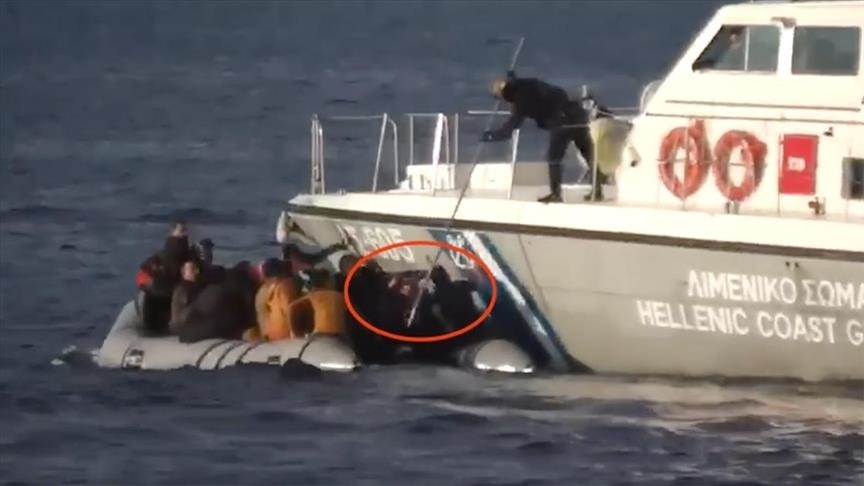EU to press Greece harder over pushbacks following recent EU court ruling: Legal analyst
European Commission can't ignore how a court of law found Greek authorities’ actions in clear violation of convention, says lecturer at Istanbul-based Turkish-German University

ISTANBUL
An expert on European law hailed a recent EU court ruling on the 2014 sinking of a migrant boat in the Aegean Sea, saying that in its wake the bloc will press Athens harder to end its controversial practice of pushing back migrants.
“I believe the European Court of Human Rights judgment will encourage (if not force) the European Commission to push the Greek government even harder on this issue,” Ralf M. Kanitz, a lecturer on EU and international law at the Istanbul-based Turkish-German University, told Anadolu Agency in an email interview.
“The European Commission cannot ignore the fact that a court of law has found the Greek authorities’ actions in clear violation” of the European Convention of Human Rights, said Kanitz, who represents the German federal government before the Court of Justice of the European Union (CJEU), but stressed that his comments represent his own personal views.
“The alleged continued practice at the Greek sea and land borders will certainly be under heightened scrutiny now,” he added.
On July 7, the European Court of Human Rights (ECHR) ruled against Athens in the landmark case, filed in 2015, a year after 11 migrants were killed when their boat sank in Aegean waters off the island of Bulamac (Farmakonisi).
It sank after the Greek Coast Guard “was traveling at very high speed in order to push the refugees back towards Turkish waters," said the court, citing testimony by a group of 16 survivors of the pushback – 13 Afghans, two Syrians, and a Palestinian national.
Kanitz also cited earlier Court of Justice rulings on illegal pushbacks against Hungary and Lithuania. “The CJEU … might soon be forced to rule on a similar question,” he added.
“And although it certainly cannot investigate and assess the facts of an individual case in the same way the ECHR can, from a legal perspective, it will most probably follow in the footsteps of the ECHR,” he added.
‘Important step forward’
Kanitz said that the judgment was not “the first one on illegal pushbacks by contracting states” of the European Convention of Human Rights.
He cited the examples of Poland and Hungary, which the court both recently found in violation of the convention and the procedural rights of the applicants.
According to Kanitz, in later judgments, the court reiterated that the expulsion of an alien may give rise to an issue “where substantial grounds have been shown for believing that the person in question, if deported, would face a real risk of being subjected to (mis)treatment … in the destination country.”
He also cited a 2012 ruling in which the court found a violation “because the applicants, who had been intercepted on the high seas (outside Italian territory), were returned to Libya without the Italian authorities carrying out any identification or examination of their individual circumstances.”
According to Kanitz, although it does have precedents, the recent ruling “still is an important step forward.”
The ruling “states that the Greek authorities violated … the convention when they were ‘pushing back’ the migrants’ boat,” he said.
“In particular, the ECHR states that the Greek authorities have an obligation to investigate allegations of illegal pushbacks,” he explained.
“This could potentially reduce the ‘whitewashing’ of Greek border policy and result in officially available data on this issue,” he added.
‘Court finds inhuman, ‘degrading’ treatment
According to the recent ruling, there was “a violation of Article 2 (right to life) of the European Convention on Human Rights under its procedural head.”
The court found there had been “shortcomings in the proceedings and concluded that the national authorities had not carried out a thorough and effective investigation capable of shedding light on the circumstances in which the boat had sunk.”
The court found that “Greek authorities had not done all that could reasonably be expected of them to provide the applicants and their relatives with the level of protection required by Article 2 of the Convention.”
The court also said there was a violation of Article 3 (prohibition of inhuman or degrading treatment), concerning 12 of the applicants who, after the ship sank, were subjected to degrading treatment on account of the body searches they underwent upon arriving on the island of Bulamac (Farmakonisi).
Citing the applicants, the court said a Greek Coast Guard vessel “was traveling at very high speed in order to push the refugees back towards Turkish waters, and this caused the fishing boat to capsize.”
The ECHR has ordered Greece to pay a total of €330,000 ($335,280) for "nonpecuniary damage sustained by the applicants.”
Human rights groups and media outlets have frequently reported on illegal pushbacks and other human rights breaches by Greek authorities.
Türkiye and global rights groups have repeatedly condemned Greece’s illegal practice, saying it violates humanitarian values and international law by endangering the lives of vulnerable migrants, including women and children.






